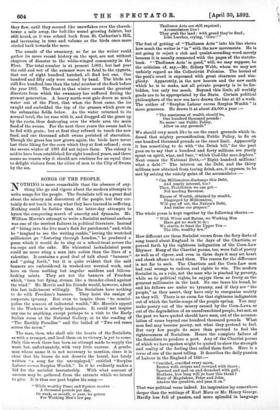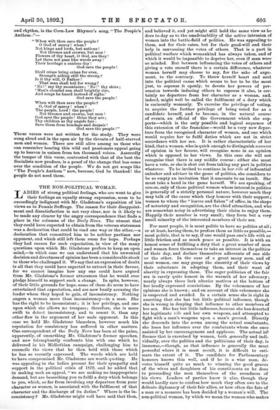SONGS OF THE PEOPLE.
NOTHING is more remarkable than the absence of any- thing like go and vigour about the modern attempts to write songs for the people. The Socialists tell us a great deal about the misery and discontent of the people, but they cer- tainly do not teach in song what they have learned in suffering. Nothing could be feebler than the latter-day attempts to hymn the conquering march of anarchy and dynamite. Mr. William Morris's attempt to write a Socialist national anthem was one of the sorriest failures in political literature. Instead of " biting into the live man's flesh for parchment," and, while be "laughed to see the writing rankle," letting the wretched millionaire go "festering through London," he produced a poem which it would do to sing at a school-treat across the tea-cups and the cake. His whimsical lackadaisical poem could no more sting a man into action than the lines of a valentine. It contains a good deal of talk about " banners " and " going forth," but it is quite evident that the said banners are embroidered in washed-out worsted work, and have on them nothing but angular maidens and bilious- looking saints. They are not the banners of Freedom which, "torn but flying, stream like a thunder-cloud against
the wind." Mr. Morris and his friends would, however, admit this last indictment willingly. The Socialists have nothing to do with Freedom's banners. They hoist the ensign of corporate tyranny. But even to inspire them " to munici- palise the sources of industrial wealth," Mr. Morris's appeal to the Workers is utterly inadequate. It could not inspire any one to anything, except perhaps to a visit to the Early Italian room at the National Gallery, or to the reading of " The Earthly Paradise " and the ballad of " Two red roses across the moon."
The man, then, who shall stir the hearts of the Socialists, as with a trumpet, and lead them on to victory, is yet to come. Only this week there has been an attempt made to supply the want, but, unfortunately, with very little success. A gentle- man whose name it is not necessary to mention, since it is clear that his brows do not deserve the laurel, has lately
written "a song for the unemployed," entitled "Surplus Labour versus Surplus Wealth." In it he evidently makes a bid for the socialist laureateship. With what amount of success may be gathered from the extracts which we intend to give. It is thus our poet begins his song:— "While wealthy Peers and Squires receive -
A thousand pounds per day, Or week, or month, or year, we grieve For Working Men's low pay. Thelluson Acts are still required ; Accumulators live !
They grab the land: with greed they're fired ; Like Leeches, crying, Give !' "
The feat of getting of " Thelluson Acts " into his line shows how much the writer is " in " with the new movements. He is not going to reject a rich and quaint-sounding word merely because it is usually connected with the pages of the statute- book. " Thelluson Acts' is good," will, we may suppose, be
the criticism of, say,—Mr. Sidney Webb, whom we may not unfairly regard as the Collectivist Polonius. The kernel of the poet's creed is expressed with great clearness and sim- plicity. Apparently, in the new heaven and the new earth
which he is to make, not all private property is to be for- bidden, but only too much. Beyond this limit, all worldly goods are to be appropriated by the State. Certain political philosophers of the new era have drawn the line at £1 a week. The author of " Surplus Labour versus Surplus Wealth " is more generous. He draws it at about £4,000 a year :— " The maximum of wealth should be, One hundred thousand pounds : No more! can Public Policy, Allow on any grounds."
We should very much like to see the exact grounds which in- duced that mighty personification, Public Policy, to fix on one hundred thousand pounds as the exact limit. Apparently it has something to do with " the Drink bill," for the poet goes on to say that a hundred and forty millions are yearly spent on spirit, wine, and beer, " which God-like men deplore." Next comes the National Debt,—" Eight hundred millions ! what a debt !" The interest on the Debt, and the thirty
millions now obtained from taxing drink, are, it appears, to be met by seizing the unholy gains of the accumulator:— "Can Millionaires discharge this Debt, And yearly interest, too ?
Then, Prohibition we can get— Not needing Revenue.
Excess of Wealth, obtained by stealth, Disgorged by Millionaires, Will pay off net, the Nation's Debt, And realise our prayers."
The whole poem is kept together by the following chorus :— " With Wives and Bairns, we Working Men
Have got no work to do ; We starve, to feast the Upper Ten — The idle, wealthy few."
How different are these Socialist verses from the fiery darts of song tossed about England in the days of the Chartists, or poured forth by the righteous indignation of the Corn-Law Rhymer. Many of the Chartist poems, too, were full of poetry
as well as of vigour, and even in these days it may set heart and cheek aflame to read them. The reason for the difference
is not far to seek. The Chartists and the Corn-Law men had real wrongs to endure, real rights to win. The modern Socialist is, as a rule, not the man who is pinched by poverty, while as to political rights, he enjoys them as freely as the greatest millionaire in the land. No one taxes his bread, he and his fellows are under na tyranny, and if they are "the people," as they assert, they have only to reorganise society as they will. There is no room for that righteous indignation out of which the battle-songs of the people spring. You may make poetry out of the misery caused by the Corn-Laws, or out of the degradation of an unenfranchised people, but not, as the poet we have quoted should have seen, out of the accumu- lation of sums beyond one hundred thousand pounds. What men feel may become poetry, not what they pretend to feel. But very few people do more than pretend to feel the righteousness of Socialism. Hence the complete failure of the Socialists to produce a poet. Any of the Chartist poems of which we have spoken might be quoted to show the strength and reality of the feeling that called them forth. Here is a verse of one of the most telling. It describes the daily passion of Labour in the England of 1840 :—
" Crucified, crucified every morn,
Beaten with stripes and crowned with thorn ; Spurned and spat on and drenched with gall ; Brothers, how long will ye bear this thrall ? Mary of Magdalene, Peter and John, Answer the question, and pass it on."
That was political verse indeed. Its inspiration lay somewhere deeper than the writings of Karl Marx or Mr. Henry George. Hardly less full of passion, and more splendid in language and rhythm, is the Corn-Law Rhymer's song, " The People's Anthem :"—
" When wilt thou save the people ? 0 God of mercy ! when ?
Not kings and lords, but nations !
Not thrones and crowns, but men ! Flowers of thy heart, 0 God, are they! Let them not pass like weeds away ! Their heritage a sunless day !
God save the people !
Shall crime bring crime for ever, Strength aiding still the strong ? Is it thy will, 0 Father !
That man shall toil for wrong? No 1' say thy mountains ; No !' thy skies ; 'Man's clouded sun shall brightly rise, And songs be heard instead of sighs.'
God save the people !
When wilt thou save the people ? 0, God of mercy ! when ? The people, Lord ! the people ! Not thrones and crowns, but men !
God save the people ! thine they are ; Thy children as thy angels fair : Save them from bondage and despair !
God save the people !"
'These verses were not written for the study. They were sung aloud and in the open air by the throatsof half-starved men and women. There are still alive among us those who can remember hearing this wild and passionate appeal going up to heaven in unison from ten thousand voices. Assuredly the temper of this verse, contrasted with that of the best the Socialists now produce, is a proof of the change that has come over the condition of the people. We do not get songs like "The People's Anthem" now, because, God be thanked ! the people do not need them.



















































 Previous page
Previous page